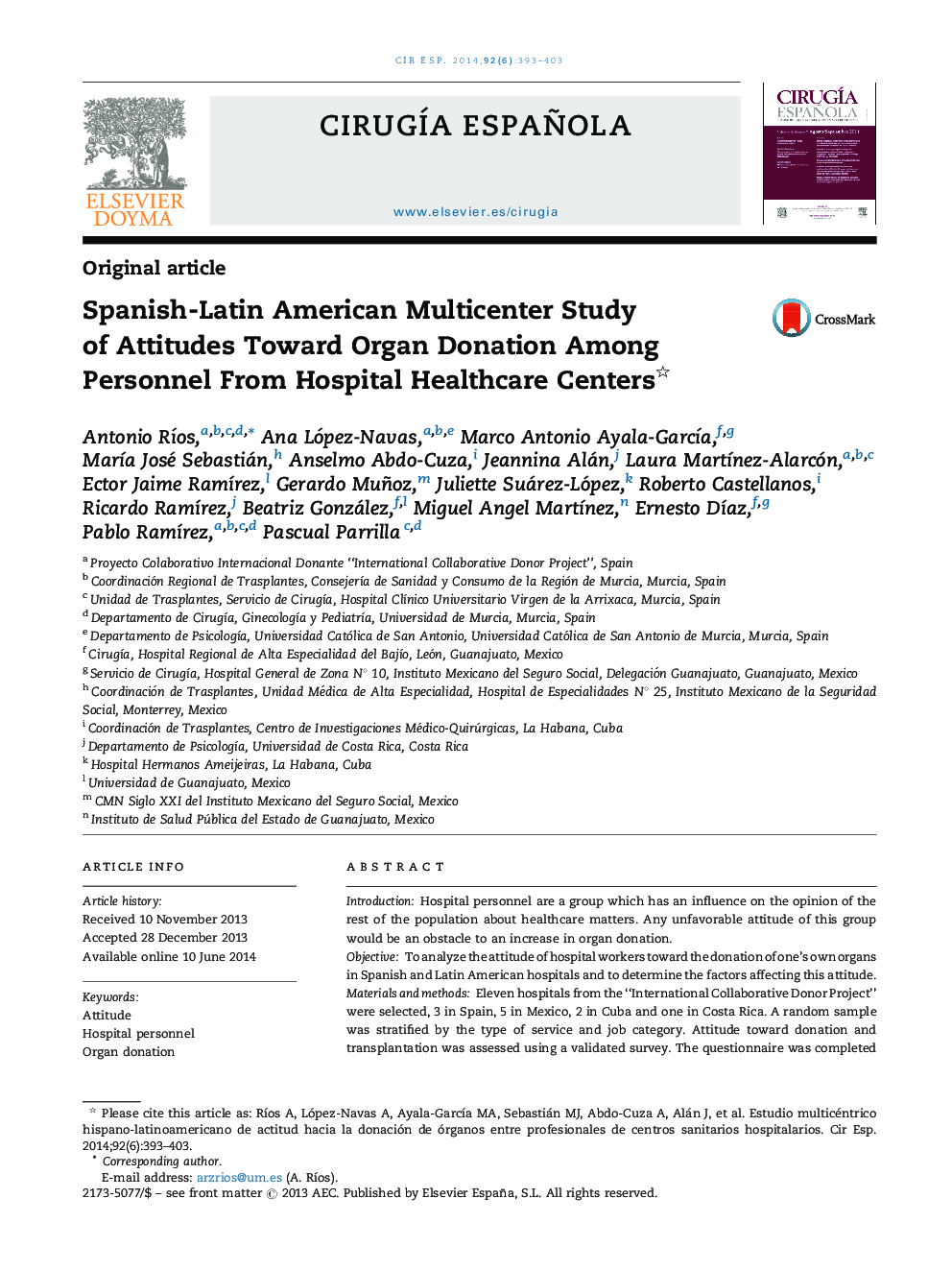| کد مقاله | کد نشریه | سال انتشار | مقاله انگلیسی | نسخه تمام متن |
|---|---|---|---|---|
| 4255417 | 1284447 | 2014 | 11 صفحه PDF | دانلود رایگان |

IntroductionHospital personnel are a group which has an influence on the opinion of the rest of the population about healthcare matters. Any unfavorable attitude of this group would be an obstacle to an increase in organ donation.ObjectiveTo analyze the attitude of hospital workers toward the donation of one's own organs in Spanish and Latin American hospitals and to determine the factors affecting this attitude.Materials and methodsEleven hospitals from the “International Collaborative Donor Project” were selected, 3 in Spain, 5 in Mexico, 2 in Cuba and one in Costa Rica. A random sample was stratified by the type of service and job category. Attitude toward donation and transplantation was assessed using a validated survey. The questionnaire was completed anonymously and was self-administered. Statistical analysis: Student's t-test, the χ2 test and logistic regression analysis.ResultsOf the 2785 workers surveyed, 822 were from Spain, 1595 from Mexico, 202 from Cuba and 166 from Costa Rica and 79% (n=2191) were in favor of deceased organ donation. According to country, 94% (n=189) of Cubans were in favor, compared to 82% (n=1313) of the Mexicans, 73% (n=121) of the Costa Ricans and 69% (n=568) of the Spanish (P<.001).In the multivariate analysis, the following variables had the most specific weight: (1) originating from Cuba (odds ratio=8.196; P<.001); (2) being a physician (OR=2.544; P<.001); (3) performing a job related to transplantation (OR=1.610; P=.005); (4) having discussed the subject of donation and transplantation within the family (OR=3.690; P<.001); (5) having a partner with a favorable attitude toward donation and transplantation (OR=3.289; P<.001); (6) a respondent's belief that his or her religion is in favor of donation and transplantation (OR=3.021; P=.001); (7) not being concerned about the possible mutilation of the body after donation (OR=2.994; P<.001); (8) the preference for other options apart from burial for treating the body after death (OR=2.770; P<.001); and (9) acceptance of carrying out an autopsy if one were needed (OR=2.808; P<.001).ConclusionsHospital personnel in Spanish and Latin American healthcare centers had a favorable attitude toward donation, although 21% of respondents were not in favor of donating. This attitude was more favorable among Latin American workers and was very much conditioned by job-related and psychosocial factors.
ResumenIntroducciónLos profesionales hospitalarios son un colectivo generador de opinión para el resto de la población en temas sanitarios. La actitud no favorable de dicho grupo es un obstáculo hacia el incremento de las tasas de donación de órganos propios de cadáver.ObjetivoAnalizar la actitud de los profesionales hospitalarios hacia la donación de los órganos propios en centros sanitarios españoles y latinoamericanos y determinar los factores que condicionan dicha actitud.Material y métodoDel «Proyecto Colaborativo Internacional Donante» se seleccionaron 11 centros hospitalarios, 3 de España, 5 de México, 2 de Cuba y uno de Costa Rica. Muestra aleatorizada y estratificada por tipo de servicio y categoría laboral. La actitud hacia la donación y el trasplante se valoró mediante una encuesta validada. El cuestionario fue anónimo y autoadministrado. Estadística: tests de la t de Student, de la χ2 y análisis de regresión logística.ResultadosDe los 2.785 profesionales encuestados, 822 son de España, 1.595 de México, 202 de Cuba y 166 de Costa Rica. El 79% (n = 2.191) está a favor de la donación de órganos de cadáver. Por país, están a favor el 94% (n = 189) de los cubanos, el 82% (n = 1.313) de los mexicanos, el 73% (n = 121) de los costarricenses y el 69% (n = 568) de los españoles (p < 0,001).En el análisis multivariante, las variables con más peso específico son: 1) país, siendo más favorable en Cuba (odds ratio = 8,196; p < 0,001); 2) ser médico (OR = 2544; p < 0,001); 3) realizar una actividad laboral relacionada con el trasplante (OR = 1610; p = 0,005); 4) haber comentado a nivel familiar el tema de la donación y el trasplante (OR = 3,690; p < 0,001); 5) la actitud a favor hacia la donación y el trasplante de la pareja (OR = 3,289; p < 0,001); 6) considerar el encuestado que su religión está a favor de la donación y el trasplante (OR = 3,021; p = 0,001); 7) no estar preocupado por la posible mutilación del cuerpo tras la donación (OR = 2994; p < 0,001); 8) la preferencia de otras opciones distintas de la inhumación en el tratamiento del cuerpo tras el éxitus (OR = 2,770; p < 0,001) y 9) la aceptación de la realización de una autopsia si fuese necesaria (OR = 2,808; p < 0,001).ConclusionesLa actitud hacia la donación entre el personal hospitalario de centros sanitarios españoles y latinoamericanos es favorable, aunque un 21% no está a favor de donar. Dicha actitud es más favorable entre los profesionales latinoamericanos, y está muy condicionada por factores laborales y psicosociales.
Journal: Cirugía Española (English Edition) - Volume 92, Issue 6, June–July 2014, Pages 393–403